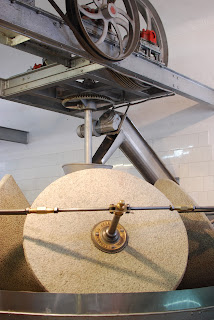The surrounding countryside on the hour long bus journey from Córdoba provided a constant reminder of why I was travelling on this ageing coach in blistering heat. With my head resting against the glass, I watched reflected a continuous vista of olive groves stretching up and down in beautifully neat lines over the gently undulating hills, nothing else but olive trees, trailing off into the distance in every direction.
Stepping off the bus, in an incredibly louche manner, I took in my surroundings, the rather sleepy Spanish market town of Baena, destination for a fair amount of the olives I’d seen on the journey, there to be squashed relentlessly and mercilessly at the hands of Núñez de Prado, makers of some of the finest organic olive oil you can get your grubby mitts on, which was exactly what I had in mind.
Taking a swig of water and bemusedly studying the map on my phone, I wandered off aimlessly into town, accompanied by Elly, in search of the famous olive oil mill, determined to bluster, cajole, bribe or threaten my way in (as it turned out, there was no need for any of this, they happily let anyone in).
Arriving unannounced in the oil mill office and enquiring about the possibility of a site tour I was a little taken aback to have the President of the company, Francisco Núñez de Prado (or Paco to his pals) stepping up to act as guide.
Joined by a handful of fellow olive oil tourists we were led around the mill by the extremely entertaining Paco, who explained the process in English, Spanish and French – with a little German thrown in, just for the sheer hell of it.
The Núñez de Prado family have been making Olive Oil for seven generations and have eschewed the use of chemicals in the growing process since 1986 being subsequently certified organic in 1990.
Harvest season runs from November-January with 160 employees picking the olives entirely by hand ‘working really fast’.
The olives are crushed in terrifying looking, rolling, heavy granite presses which date from just after the Spanish Civil War, in 1944 and were installed by Paco’s father.
The resulting paste is then hydraulically pressed. They only produce Extra Virgin Olive Oil and there is only a 1st cold pressing.
The company’s primo product is Flor de Aceite or ‘Flower of the oil’ a free run EVOO that is produced by squeezing the crushed olive oil paste between mats, 10 kilos between each mat with a total of a tonne being pressed at a time. The end product is the oil that seeps out. 11 kilos of olives are needed to make just 1 litre of this oil.
After pressing the olive oil is pumped into glass tanks that are hermetically sealed to prevent flavour contamination. As the oil sits, it separates naturally from the water, which is then pumped away. Nothing is wasted, this ‘black water’ and the leftover crushed, tasteless olive oil paste is combined and used on the olive groves as a fertiliser.
The finished oil is then rested for a couple of months before bottling.
And that is more or less that. We then got the opportunity to purchase some of this exceptional product at almost ridiculous knock down prices £4.25 for a bottle of the Flor de Aceite. Thank you very much, stick me down for a case.
I found the whole thing fascinating, probably because the process is so beautifully simple, just like me. Also, I hadn’t really considered how olive oil was actually made, I mean, I had intelligently surmised you squashed the olives, but had absolutely no idea what the actual squashing operation looked like. Now I do. Artisanal squashy.
Afterwards we had a quick wander around Baena, noting that olives, somewhat unsurprisingly for a town surrounded by the things, are sold absolutely everywhere.
Feeling a bit sharp-set and having an hour or so to kill before our bus back to Córdoba we wandered into a bar down the road from the bus station, where the bocadillos we ordered (despite taking an age to arrive, what with the kitchen actually making a tortilla from scratch for the filling) were each about the heft of a midget’s arm. These combined with some patatas and a bottle of water came to10 Euros. Bar La Tella, I salute you and your two-fingered attitude to proportion.
I have much to share with you all about Spain in the coming weeks. I basically ate and drank my way non-stop around three cities, no doubt forever ruining my health, just for this blog and its readers. I really hope all 3 of you appreciate it.









4 comments:
Its appreciated!
I didn't realise how much effort went into producing olive oil - Pretty insightful. :)
Naomi - thanks very much. Just waiting to hear from the other two now ;)
Jemma - Glad to hear you've learnt something from my drivel.
Based on yours and Elly's Instagram feeds I'd say there's months of blog-fodder to plunder - looking forward to any that you choose to furnish us with :)
Post a Comment